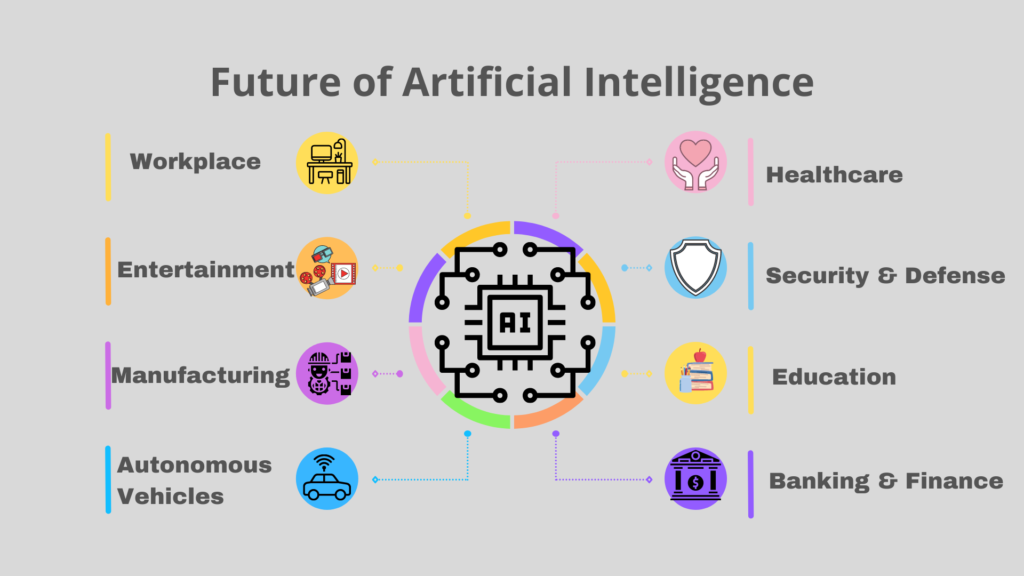Future Of Artificial Intelligence: Truly Intelligences

AI is a new field that is now referred to as “weak AI” (due to limitations). However, establishing effective AI is the future of artificial intelligence.
AI could presently only outperform humans in a few specific tasks, but it is believed that in the future, AI will be able to beat humans in all cognitive tasks.
It will undoubtedly have both positive and negative implications.
Artificial intelligence (AI) is a revolutionary discipline of computer engineering that is poised to be a crucial element of several future technologies, such as big data, robotics, and the Internet of Things (IoT).
In the years ahead, this will continue to be a technical trailblazer. AI has evolved from science fiction to realism in a matter of years.
Machines that assist people with intelligence can be discovered in the real world as well as in science fiction films.
We currently exist in a world of artificial intelligence, which was only the case a few years ago.
The future of AI and its impact on human existence will be discussed in this topic, including whether AI is a great technology or a threat to humanity.
What is artificial intelligence?
Artificial intelligence is a topic of research in which computers are programmed to perform tasks that humans do. Computers are speedier when it comes to calculations and analytical abilities, but they cannot make judgments on their own, as they cannot do so.
Artificial intelligence (AI) is the process of allowing computers to make decisions based on their intelligence. Nowadays, AI has a wide range of applications in practically every industry, which appears to be positive and is displacing human occupations that could be considered unfavorable.
AI is now a part of our daily life; we use Alexa and Google Home, which are both quite straightforward to use and offer nearly correct results.
The recommendation to complete sentences can be seen in email writing. AI technologies are assisting in military action, warfare plans, and weapon technology, in addition to our daily lives.
AI has improved cybersecurity to the point that security systems can now recognize a pattern of cyber threats and construct a strategic counter-attack security solution to address them.
Why research AI safety?
Mostly in the short term, the overall goal of limiting AI’s negative impact on civilization motivates research in a variety of disciplines, ranging from economics and law to technological concerns like verification, validity, security, and control.
If your laptop fails or is hacked, it’s all the more vital that an AI system does what you want it to do if it’s in charge of your automobile, airplane, pacemaker, automated trading system, or power grid.
Avoiding a deadly armed conflict with lethal autonomous weapons is another short-term challenge.
In the long run, a key question is what will happen if the drive for strong AI succeeds and AI systems outperform humans in all cognitive tasks. Designing superior AI systems, as I.J. Good pointed out in 1965, is a cognitive endeavor in and of itself.
Such a system might theoretically undergo cyclical self-improvement, resulting in an intelligence explosion that would be far above human intelligence.
Such superintelligence might help mankind erase war, sickness, and hunger by inventing breakthrough new technologies, and hence the development of strong AI could be the most significant event in human history.
However, other scientists are concerned that it may be the last unless we can learn to align the AI’s aims with ours before it becomes super intelligent.
Why The Recent Interest In AI Safety?
Many major AI experts have joined Stephen Hawking, Elon Musk, Steve Wozniak, Bill Gates, and other big names in science and technology in expressing alarm about the risks posed by AI in the media and via open letters. Why is this topic suddenly in the news?
The idea that the pursuit of strong AI would eventually succeed was once regarded to be science fiction, centuries or perhaps millennia in the future. However, because of recent advancements, several AI milestones that were once thought to be decades away have now been achieved, prompting many scientists to consider the potential of superintelligence in our lifetime.
While some experts believe that human-level AI is millennia away, the majority of AI researchers at the 2015 Puerto Rico Conference predicted that it would be sooner rather than later.
We have no way of knowing how AI will act because it has the potential to become more intelligent than any human. We can’t take previous technical advancements as a starting point because we’ve never produced something that can outsmart us, either intentionally or unintentionally.
Our evolution may be the best indication of what we may face. People today rule the world, not because they are the strongest, quickest, or largest, but because they are the most intelligent. Will we be able to maintain control if we’re no longer the smartest?
Artificial Intelligence (AI) at Present:
Before delving into the future of AI, it’s important to first grasp what artificial intelligence is and where it’s currently at.
“It is the ability of machines or computer-controlled robots to execute tasks that are associated with intelligence,” as we can define AI. As a result, AI is a branch of computer science whose goal is to create intelligent machines that can replicate human behavior.
AI can be classified into three categories based on its capabilities:
- Narrow AI: It is capable of intelligently accomplishing specific tasks. AI is now in a restricted stage.
- Artificial General Intelligence, or AGI, is a term that refers to machines that can mimic human intelligence.
- Super AI refers to self-aware AI that has cognitive capacities that are superior to humans. It is a level at which machines with cognitive abilities can perform any task that a human can.
At this time, AI is classified as either narrow AI or weak AI, which can only do specific jobs. Self-driving automobiles, voice recognition, and other technologies are examples.
How can Artificial Intelligence be risky?
The majority of scientists feel that super AI will never be able to express human emotions like love, hate, or kindness. Furthermore, we should not expect an AI to become benevolent or vengeful on purpose. Furthermore, if we consider AI to be risky, there are primarily two scenarios:
AI is programmed to do something destructive.
Artificial intelligence systems that are also intended to kill are known as weapons systems. This weaponry might easily result in huge fatalities if it falls into the wrong hands.
Furthermore, such AI-armed conflict could accidentally lead to war with massive victims. To avoid being unsatisfied with the opponent, these weapons would be engineered to be incredibly difficult to “switch off,” allowing people to lose control in a circumstance like this.
This risk exists even with restricted AI, but it increases as AI intelligence and autonomy improve.
Misalignment between our goals and machines:
The second reason AI is a risky technology is that even if intelligent AI is supposed to be useful, it might have harmful outcomes.
As an example, assume we instruct the self-driving car to “transport us as quickly as possible to our destination.” Our instructions will be instantly followed by the machine.
It could be hazardous to human lives unless we clarify that traffic regulations must also be followed and that human life is valued.
It may violate traffic laws or cause an accident, which is not exactly what we wanted, but it completed the task at hand. As a result, super-intelligent machines can be destructive if they ask to achieve a goal that does not match our standards.
Future of Artificial Intelligence in Different Sectors

Future of AI in Healthcare:
Inside the healthcare industry, AI will be essential for rapidly and reliably diagnosing problems. Also, with the help of AI, new drug development will indeed be quicker and more cost-effective.
This will also improve patient involvement in medical care by making appointment booking and bill payment easier, even with fewer errors. Besides these helpful applications, one of AI’s greatest challenges in healthcare is ensuring its acceptance in routine clinical operations.
Future of AI in cybersecurity:
Without the need for a question, maintaining data security is indeed a top priority for every business. Below seem to be some predictions about just how cyber security will alter as a result of AI:
- Security mechanisms will indeed be monitored using AI techniques.
- NLP is being used to determine the source of cyber-attacks.
- RPA bots have been used to execute rule-based management and operations.
As a brilliant technology, however, it may be used by attackers as just a threat. They could employ AI in an improper way by automating attacks that seem difficult to defend.
The Future of AI in Transportation:
Mostly in the transportation industry, a completely autonomous vehicle has not yet been produced, but researchers have been working on it.
In aircraft, artificial intelligence and machine learning have been used to help minimize workload, manage pilot stress and frustration, and increase on-time performances.
There are several obstacles to AI adoption in transportation, especially in public transit. There is indeed a substantial threat of it becoming overly dependent on automated and autonomous technologies.
The Future of AI in E-Commerce:
Throughout the near future, artificial intelligence will play an important role in the e-commerce industry.
It would have a positive influence on every aspect of the e-commerce industry, including customer experience, sales, marketing, and delivery.
In the future, we could expect e-commerce to also include automated warehousing and inventory management, shopper customization, and the employment of chatbots.
The Future of AI in Employment:
Due to the obvious usage of artificial intelligence, finding a new job has now become simpler for both job seekers and employers.
In the employment market, AI is already being employed with stringent regulations and algorithms that immediately disqualify an employee’s résumé if it does not meet the company’s requirements.
Most AI-enabled applications, spanning from written interviews to teleconference rounds, are expected to drive the job process in the future.
Advanced artificial intelligence programs, such as Rezi, Jobseeker, and others, are assisting job seekers in creating great credentials and finding the perfect position for their skills.
Future of AI in Education
The level of education received by youngsters determines a country’s progress. We can see that there are a lot of courses accessible on AI right now.
However, AI will transform traditional education mostly in the future. Manufacturing sectors no longer require skilled laborers, as robots and technology have mostly replaced them.
The educational system has the potential to be very effective and tailored to the individual’s personality and abilities. It would provide opportunities for brighter pupils to shine, as well as a better opportunity for imbeciles to catch up.
On the one hand, proper education may strengthen individuals and nations; on the other hand, improper education can have disastrous consequences.
Future of AI in Finance
Any country’s economic and financial situation is directly tied to its growth quantification. Because AI has so much potential in practically every industry, it has a lot of potential to improve people’s economic health and the economic health of a country.
The AI algorithm is now being used in the management of equity funds. When determining the optimal approach to handling funds, an AI system could consider a large number of variables. It would outperform a human supervisor.
In the world of finance, AI-driven tactics are set to disrupt traditional trading and investing practices. It could be disastrous for some fund management organizations that cannot afford such facilities, and it could have a large-scale impact on business because the choice would be made quickly and abruptly.
The competition would be fierce.
Conclusion
As we covered in the article, artificial intelligence-assisted systems have a wide range of applications that might greatly improve the quality of our lives. On the one hand, technology can be a benefit to society when utilized for enhancement, but it can also be a curse if it falls into the wrong hands.
We’ve talked about AI’s future in industries like finance, health care, education, and military applications, where it might have a favorable or harmful impact.
People May Ask
Q- What role does artificial intelligence play?
A- Machines may learn from their experiences, adapt to new inputs, and execute human-like jobs thanks to artificial intelligence (AI). Most AI examples you hear about today rely largely on deep learning and natural language processing, from chess-playing computers to self-driving cars.
Q- What impact will artificial intelligence have on society’s future?
A- Artificial intelligence has the potential to significantly increase the efficiency of our workplaces while also augmenting the jobs that humans can accomplish. When AI takes over mundane or dangerous duties, it frees up human labor to focus on tasks that require creativity and empathy, among other skills.
Q- What role does artificial intelligence play in our daily lives?
A- Voice assistants, picture recognition for face unlocking in mobile phones, and machine learning-based financial fraud detection are all examples of AI software that people use every day. AI software is frequently as simple as downloading AI-capable software from an online store and does not require any additional hardware.
Q- In the future, what will artificial intelligence be?
A- Artificial intelligence (AI) is a breakthrough discipline of computer science that is poised to become a key component of several future technologies such as big data, robotics, and the Internet of Things (IoT). In the coming years, it will continue to be a technical trailblazer.
Q- What is the impact of artificial intelligence on the world?
A- Modern artificial intelligence systems are capable of capturing and ‘understanding’ their environment in real-time, as well as making optimal judgments in milliseconds based on various signals. AI is already altering our environment, with applications ranging from self-driving cars to healthcare.







